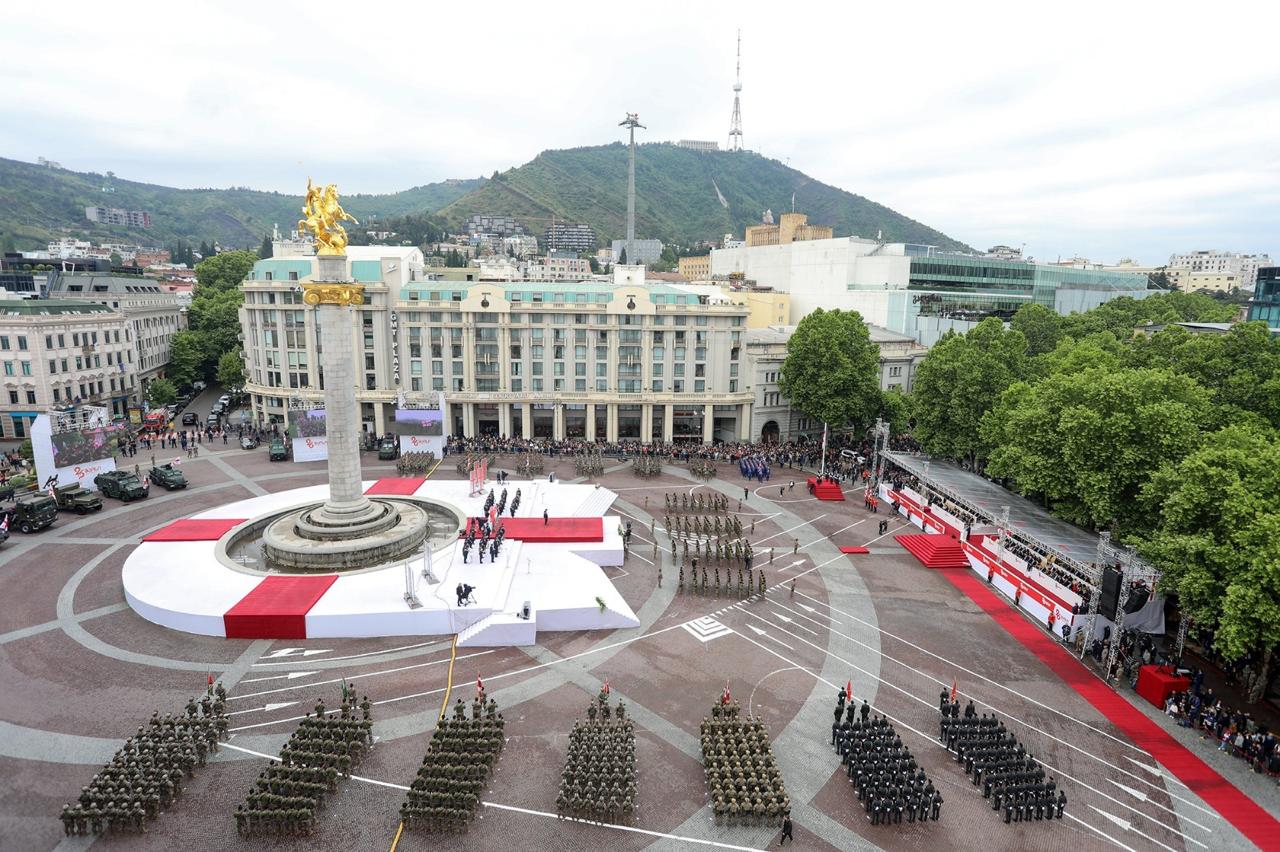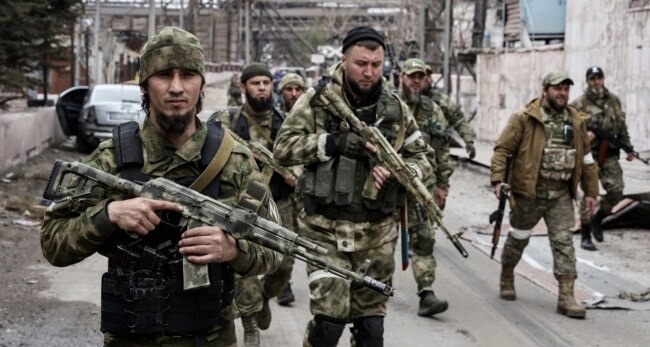
Georgia, Losing Western Support, Risks Missing Opportunity to Restore Territorial Integrity
Georgia, Losing Western Support, Risks Missing Opportunity to Restore Territorial Integrity
Executive Summary:
- Officials in Russia and the occupied Georgian territories of Abkhazia and South Ossetia decried Prime Minister Irakli Kobakhidze’s declaration that by 2030, Georgians will once again live with Abkhazians and Ossetians.
- Georgian Dream officials and propagandists have alluded to a backdoor agreement between Moscow and Tbilisi on the restoration of Georgia’s territorial integrity in exchange for formalizing the country’s pro-Russian course.
- Georgians are already concerned that the formalization of a hostile approach to the West and deepening of strategic partnership with China may hurt the country’s policy of non-recognition of the occupied territories.
On May 26, speaking at a public event on Tbilisi’s main square honoring Georgian independence, Prime Minister Irakli Kobakhidze said that by 2030, Georgians will live together with Abkhazians and Ossetians (Facebook.com/KobakhidzeOfficial, May 26). With this statement, the formal leader of the country continued the ruling party’s active manipulation of public opinion on the supposed restoration of Georgia’s territorial integrity (see EDM, March 19). That same day, some Russian officials decried the pro-Russian Georgian Dream’s plans, putting Moscow’s allies in Tbilisi in an awkward position. Grigory Karasin, chair of the Russian Federation Council Committee on Foreign Affairs, called Kobakhidze’s words “reasoning from the evil one” (TASS, May 26). Konstantin Zatulin, first deputy chair of the Russian State Duma Committee on Commonwealth of Independent States Affairs, asked, “How will the prime minister of Georgia by 2030 return Abkhazia and South Ossetia, which are developing as independent states under the protection of Russia?” (Gazeta.ru, May 26). The administrations of the occupied regions also pushed back. The “Ministry of Foreign Affairs” in Abkhazia declared that “any attempts by the Georgian leadership to return the Republic of Abkhazia to Georgia are futile” (TASS, May 27). Similarly, South Ossetia’s “Ministry of Foreign Affairs” said, “The decision on the development of an independent state and the development of integration with Russia is not subject to revision” (RIA Novosti, May 26). The response from Moscow and the breakaway territories demonstrates that the Georgian Dream’s pro-Russian position may mean that Georgia will miss out on restoring its territorial integrity.
Georgian Dream propagandists have actively and indirectly hinted at an alleged behind-the-scenes agreement between Moscow and Tbilisi (see EDM, March 19). As part of that accord, in exchange for the adoption of the Russian-styled “foreign agents” law and the formalization of the country’s pro-Russian course, Moscow would be ready to return the occupied territories to Georgia. However, as these voices reached Sukhumi and Tskhinvali, the separatists became nervous. Various myths and rumors are spreading in Abkhazia that the informal leader of Georgia, billionaire Bidzina Ivanishvili, could use the resources of Russian oligarchs of Georgian origin to buy up Abkhaz assets and lands (JAM-news, May 29). Earlier, the “president” of Abkhazia even tried to scare the public by alleging that Georgia’s military budget is equal to the region’s entire “state” budget (Ekhokavkaza.com, April 25).
Now, Georgian Dream has not only lost its main trump card in the form of talking about restoring Georgia’s territorial integrity, but the issue has been turned against the ruling party as well. In particular, some Georgians are already concerned that the formalization of a hostile approach to the West may hurt the country’s policy of non-recognition, which has enjoyed 16 years of success thanks to Western support. The West has been taking preventive measures for many years and doing enormous diplomatic work to prevent recognition of the so-called “independence” of Abkhazia and South Ossetia by countries in Asia, South America, or Africa, which Moscow has pushed.
Georgian Dream officials seemingly do not understand the severe consequences of the loss of Western support and how that could negatively affect the issue of Georgia’s territorial integrity. On May 27, during a discussion on the presidential veto of the foreign agents law at the Legal Affairs Committee of the Georgian Parliament, one opposition members of parliament asked, “If Georgia finds itself in international isolation, what risks might Georgia’s policy of non-recognition face?” (1tv.ge, May 27). Georgian Dream officials reacted with hysteria. Chair of the Georgian Parliament Shalva Papuashvili claimed that the question reflected the invisible intentions of external forces to blackmail the Georgian government. He stated, “The territorial integrity of Georgia is guaranteed by international law. Therefore, there is no need for us to thank anyone [i.e., Western countries] for supporting international law” (Facebook.com/shpapuashvili, May 27).
Georgia’s loss of Western support means the country will be left to deal with Moscow on its own. Tbilisi can hardly hope that its new strategic partner, China, will step in (see EDM, August 10, 2023, February 6, March 5). For years in the UN General Assembly, Beijing has generally abstained from taking part in voting on the resolution of the status of forcibly displaced persons and refugees. The exception was in 2022 when China took part in the vote and voted against Georgia (Batumelebi.ge, March 23). The most shameful vote for the Georgian Dream on this annual UN resolution came on June 4. China, now for the first time as a strategic partner, again did not take part in the voting and thereby did not support the resolution to return Georgian refugees to the occupied regions. Georgian Dream officials will almost certainly have to explain to the domestic population why its vaunted new partner let them down. Since 2008, Georgia has annually presented a resolution that envisages the return of Georgian refugees to their homes in Abkhazia and the Tskhinvali region (“South Ossetia”).
Abkhazia is carefully monitoring the process of Georgia distancing itself from the West, though the separatists seem split on whether a pro-Western or pro-Russian Georgian government would be more favorable. Some hold the opinion that if Georgia finally moves toward EU and North Atlantic Treaty Organization (NATO) membership, the return of these territories would become irrelevant (JAM-news, May 27). While some Abkhaz sources indicate that the Abkhazians are against the adoption of the foreign agents law in their territory, they very much welcome the approval of such a law in Georgia to subordinate the rest of the country to Moscow’s influence.
Despite the Kremlin’s demands, the puppet regime of Abkhazia has still not adopted the law on foreign agents. The main lobbyist for the law in Abkhazia, “Foreign Minister” Inal Ardzinba, was even removed from office on May 7 and returned to Moscow (Ekhokavkaza.com, May 7). Russia had sent him to Sukhumi two years ago to strengthen the Kremlin’s position in the occupied region. In Abkhazia, in 2023, “presidential” decrees had already banned some US Agency of International Development projects aimed at peaceful dialogue with Tbilisi. The adoption of a law on foreign agents in Georgia already partially removes from the agenda the issue of adopting a similar law in occupied Abkhazia. The fact is that most international organizations in the occupied region work exclusively in coordination with Tbilisi’s consent. If, as a result of the adoption of the law on foreign agents, the offices of foreign foundations and international organizations gradually close in Georgia, then this will undoubtedly be followed by the closure of their branches in the occupied regions as well.
On the one hand, Georgia’s true allies—the United States, NATO, and the European Union—will likely never stop supporting the restoration of the country’s territorial integrity. On the other hand, in conditions where the Georgian Dream has started a strange geopolitical game, Georgia’s Western partners, especially after the 2024 elections, may simply grow tired of Georgia’s problems should Tbilisi continue to build bridges with Moscow and Beijing while destroying connections with the West.

